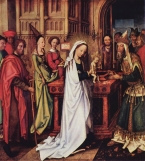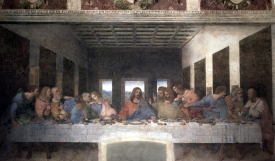Peter is one of my favourite characters in the Bible. He's passionate, bumbling, keen, and basically a bit of a mess. He also has the Church built upon him, which is pretty cool.
Why is Peter my favourite, though? Why not Paul – who wrote half the New Testament and spread the good news of Jesus far and wide across the known world? Why not Mary – the mother of Jesus, without who's obedience to God, we wouldn't have the gospel? Well, sometimes, I find it a little bit hard to relate to them. Paul was beaten, stoned, imprisoned and eventually killed for preaching the gospel – but I struggle to relate to how joyful he feels after all those incidents, as inspiring as they are. In 2 Corinthians, he says: "We were under great pressure, far beyond our ability to endure, so that we despaired of life itself. Indeed, we felt we had received the sentence of death. But this happened that we might not rely on ourselves but on God, who raises the dead." It's great, inspiring stuff, but it's not how I feel a lot of the time.
What about Mary? Well, she was an unmarried teenager when the angel Gabriel visited her to tell her she was pregnant. The shame of this would have been devastating. She must have worried that Joseph would surely leave her, or even worse. Disgraced women at that time risked death by stoning. Yet she trusts in God. "My soul glorifies the Lord, and my spirit rejoices in God my Saviour, for he has been mindful of the humble state of his servant. From now on all generations will call me blessed." (Luke 1:48) This was her humbling response to being told unexpected, and on many levels bad, news.
Yet I still come back to Peter. The very first time we meet Peter in the Gospels, we realise Jesus is doing something very different to what many would have expected of the Messiah. He calls Peter to join him: "'Come, follow me,' Jesus said, 'and I will send you out to fish for people.' At once they left their nets and followed him." (Matthew 4:19-20)
Jesus was a Jewish rabbi. In those days, a rabbi would have chosen his disciples when they were very young. He would also have chosen those who knew the Scriptures best – the academically gifted ones, the brightest and best. The fact that Peter was a fisherman meant that he had already missed the chance to be the disciple of a rabbi. But Jesus called him anyway. Immediately this gives us a connection. Most of us aren't intellectual giants. Most of us don't have the academic skills required to be a rabbi's disciple. Jesus called Peter despite this.
In one of the most famous incidents in the lives of both Jesus and Peter we learn that: "Peter got down out of the boat, walked on the water and came towards Jesus. But when he saw the wind, he was afraid and, beginning to sink, cried out, 'Lord, save me!' Immediately Jesus reached out his hand and caught him. 'You of little faith,' he said, 'why did you doubt?'" (Matthew 14:29-31)
When Peter stepped out, it was stormy. He stepped out in faith – he trusted Jesus, and yet all it took was a little glance at how windy it was, and his faith failed him. I'm sure many of us can relate to Peter here. The forces of doubt can be stronger than the forces of faith, and we start to sink.
Fast forward to the garden of Gethsemene. They've just had the last supper together. Jesus has been explaining what's about to happen – but typically, Peter hasn't quite got it. Jesus has been betrayed by Judas and then: "Simon Peter, who had a sword, drew it and struck the high priest's servant, cutting off his right ear... Jesus commanded Peter, 'Put your sword away! Shall I not drink the cup the Father has given me?'" (John 18:10-11)
In the very moment where Jesus is being handed over, Peter manages to get it wrong. He's trying to do the right thing, but he's just doing it in totally the wrong way. I recognise this in myself – I'm very quick to dive in and shout loudly if I think something's not right. Later, I might wonder if my response was really the most constructive way to help, or the thing that Jesus would have wanted me to do. It's not that Peter is 'wrong' to see the injustice of Jesus being arrested and betrayed. It's just that his response is the wrong one.
Then comes one of the most famous bits of Peter's life. He denies Jesus three times. Jesus had told him earlier that he would do it. Peter said he wouldn't. "'Didn't I see you with him in the garden?' Again Peter denied it, and at that moment a cock began to crow." (John 18:26-27)
Imagine how Peter was feeling at that moment. He'd spent the last three years following Jesus around, convinced he was the Messiah. Then it had all fallen apart. Jesus had been arrested and he had denied him three times. It must have been the lowest point of his life. In just a few days everything had gone wrong.
At this point it's not looking good for Peter, is it? But God had other plans. Like so many biblical characters before him, like Moses, Noah, Rahab, David, Gideon, Samson and others, Peter was set to be used by God – in spite of his many failures and faults.

After the resurrection, Jesus reinstates Peter. In the same way that he'd denied him three times, we read that Jesus reinstates Peter by giving him an instruction three times. "Jesus said, 'Feed my sheep. Very truly I tell you, when you were younger you dressed yourself and went where you wanted; but when you are old you will stretch out your hands, and someone else will dress you and lead you where you do not want to go.' Jesus said this to indicate the kind of death by which Peter would glorify God. Then he said to him, 'Follow me!'"
Three times he had denied Jesus. Three times Jesus restores him – the man who was going to carry on Christ's earthly ministry. So what we've got so far is a classic story of redemption. Peter was an obscure fisherman. Jesus chose him and he became a disciple. He was a mess and then he failed badly and betrayed Jesus, but then Jesus restored him and everything worked out fine, right?
Well, not quite. From this point on, Peter did go on to do great things. He healed the sick in the power of Jesus, he preached the most famous sermon of all time on the day of Pentecost when three thousand people became Christians and the Church began, and he did go on to be crucified for preaching the gospel. In other words, he did exactly as Jesus said – he built the Church in the power of the Holy Spirit.
He also continued to get things wrong. In Galatians, Paul tells of an incident where he has to confront Peter because he was not "acting in line with the truth of the gospel". He was human, he was fallible and even though he'd been transformed by Jesus, he was still Peter. Still capable of messing up, making errors and letting his friends down.
Peter gives us a role model we can relate to. He's a man who wore his heart on his sleeve, made many mistakes, both before and after Jesus' resurrection. Yet ultimately he recognised Jesus for who he was and he persevered to the end in spreading the good news. He's a role model for us, not because he was perfect – in fact, the very opposite. Because he was imperfect, but God used him anyway.
















